| Prize Winners > | Runners-up > | Jurors > | IPCEM & Event > | Photo Gallery > |
| Finalists in the Audiovisual Division > | Finalists in the TV Proposal Division > | |||
Session 1
[ Bringing the Past into the Future -50 years of the JAPAN PRIZE- ]Fifty years ago, in 1965, the JAPAN PRIZE was inaugurated as the world’s first international competition for educational programs. At this year’s session, past award winners were screened, as a review of the history of educational content.
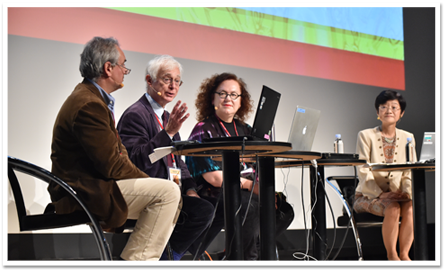
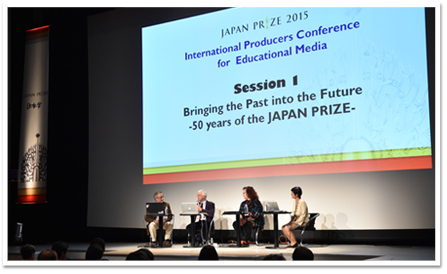
The BBC’s Mr. George Auckland talked about the evolution of educational media in the course of his long career. The keys to learning, he said, are interactivity that enables learning anytime, anywhere; and the provision of an adequate amount of information. NHK’s Ms. Sachiko Kodaira added that learning should not be something that depends on technology, and that what is important is the motivation behind it – what you want to learn, or what you want to teach.
Ms. Tuula Rajavaara of Finland’s public television network, YLE, cited the first JAPAN PRIZE winner, The Calendar of Nature: Once Upon A Time, as an example. This Finnish program shows the lives of animals, juxtaposed with children playing in nature, without narration or music. When it was screened in 1965, it generated vigorous debate about whether or not the show could be called educational. When it was awarded the first JAPAN PRIZE, the competition found its purpose: “to think about new approaches to education.” She argues that producers should not be afraid of failure and need to be eager to try new things with flexibility and passion.
Ms. Kodaira talked about the wider range of topics covered in educational content today. In the early days of the JAPAN PRIZE, most programs were about language and science, for example, and were designed to supplement school curriculum. In recent years, though, programs increasingly address social problems such as drug abuse, discrimination, and the aging population, as well as more general subjects that encourage the viewer to think about humanity. This trend is seen in programs not only for adults but also for children.
In conclusion, Mr. Nikel said that producers around the world should collaborate to further increase the potential of educational content.
Panelists: |
Moderator: |
|||

Former Head of Innovation, BBC Learning (UK) |

Director / Script writer / Producer Finnish Broadcasting Company (YLE) |

Senior Researcher, NHK Broadcasting Culture Research Institute (Japan) |

Consultant International Projects RAI Educational (Italy) |
|
Session 2
[ Literacy Towards Understanding Different Cultures ]Conflicts triggered by cultural differences – over such things as race, religion, lifestyle, or custom – are happening all over the world. Although other cultures are often not easy to understand or empathize with intuitively, in order to stop these conflicts, it is essential to develop mutual understanding. In this session, panelists discussed what producers of educational content can do to further this goal.
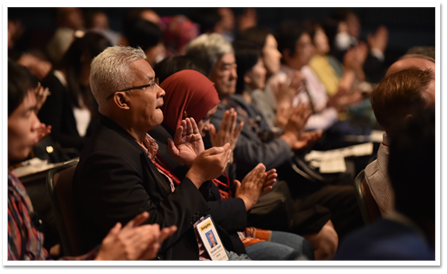
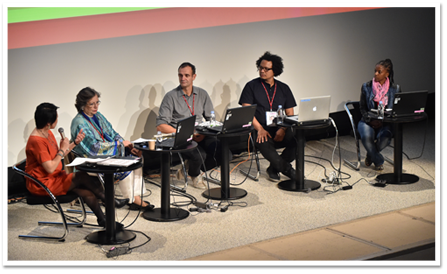
Ms. Moneeza Hashmi: “There are terrorist incidents and religious conflicts happening in Pakistan, too. The key to stopping them is dialogue. By ensuring various voices are heard, dialogue should be promoted. In addition, when an incident happens, the media should explain its context, why it has happened, instead of just reporting who is responsible for it.”
Mr. Carlos Eduardo Smith Rovira: “In Colombia, after a half-century of civil war between the government and rebel groups, a peace agreement is finally going to be signed. However, some children have grown up with the war, and perceive fighting as the norm. In such circumstances, one role of producers should be to convey the truth in simple terms and pave the way toward peace. In fact, in Colombia, TV programs often cover sensitive issues, such as child soldiers and abduction.”
Ms. Jacqueline Hlongwane: “South Africa has a dark history of racism under apartheid. Despite the fact that apartheid was abolished in 1994, racism is still rampant today – in recent years, often in the form of the exclusion of immigrants. However, it is difficult to interest schoolchildren in learning the history and culture of their own country. Despite this lack of interest, it is important to teach history to children, to avoid repeating the same mistakes.”
Mr. Francois Bertrand: “In January 2015, the editors of a French weekly satirical magazine Charlie Hebdo were murdered by Islamic extremists. Since then, public opinion in France has been polarized, but in order to have a nuanced public discussion, it’s important to be able to show gray areas. Media are influential in various ways. They can connect people, but at the same time they can divide people. Therefore producers must use media responsibly for the improvement of society.”
Panelists: |
Moderator: | |||

President
Public Media Alliance (Pakistan) |

Director
HIERROanimación S.A.S. (Colombia) |

Programme Manager: SABC 2
South African Broadcasting Corporation (South Africa) |

CEO, Producer
Camera Lucida Productions |

Director, United Nations Information Centre in Tokyo (Japan) |
Session 3
[ Exploring the Future of Digital Learning ]A review of the finalists in the Creative Frontier category became a discussion of the future of digital learning.
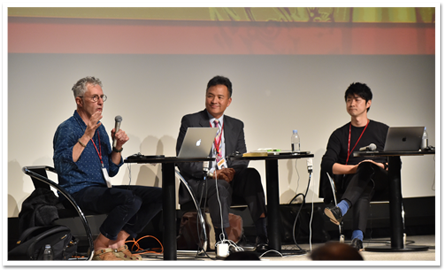
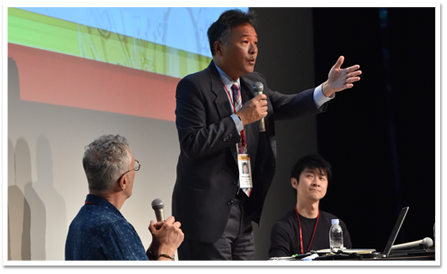
Dr. Milton Chen outlined three ways digital technology has influenced learning: 1) providing a much greater volume of knowledge; 2) educating the whole child – it has become possible to educate a child using his or her entire body, head, heart and hands; and 3) allowing children to be the focal point, and to learn proactively. Dr. Chen coined the word “EdYOUcation,” meaning, you at the center of their own learning.
Mr. Kinya Tagawa is a designer for an educational program called Mimicries. He would like to help deepen people’s understanding through design and visualization, for example, using apps that visualize mathematical functions, which he has developed with an education company, and the Japanese government’s big-data visualization system. He said that in order to try such new approaches, you need to be open-minded and deal with things that are as yet undefined.
Later, after the six finalists in the Creative Frontier category were introduced, a Q&A was held and opinions were actively exchanged, such as: “In Japan, schoolteachers often don’t know about new platforms such as FabLab and FabCafe”,“To make good use of diverse digital content, we need to provide training for teachers” and “In today’s world of information overload, it is important to know how to filter and think about search results.”
Finally, Dr. Chen and Mr. Tagawa concluded the session by expressing their own philosophy of education: “Education must be able to ignite children’s curiosity. It is important that we be able to accommodate any questions children have”, “It is adults’ mission to provide young people with a variety of choices. My goal is to develop people who are capable of handling undefined things.”
Panelists: |
Moderator: |
||

Senior Fellow & Executive Director Emeritus, The George Lucas Educational Foundation (GLEF) (USA)
|

Director/Design Engineer,
takram design engineering (Japan) |

eLearning Consultant Former Executive Producer, BBC Learning (UK) |
